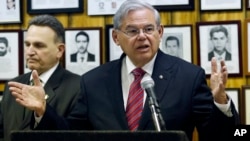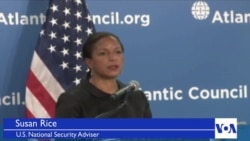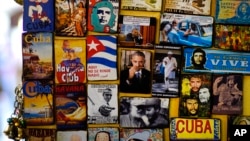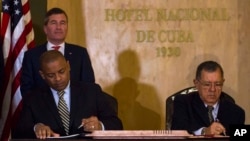American lawmakers have differing expectations about President Barack Obama's visit to Cuba. Some think the trip will give both countries a chance to strengthen their recently renewed relations, but others say the historic visit marks a concession by the United States to Havana’s flawed human rights record.
Senator Jeff Flake of the western state of Arizona said he was excited to be traveling to Cuba with Obama on Sunday, along with several other members of Congress from both major U.S. political parties.
Flake, a Republican, said he hoped the presidential visit would result in improved conditions for the Cuban people.
“It's always bothered me that, as Republicans, we talk about engagement, travel and commerce as something that will nudge countries toward democracy," Flake said. "But with Cuba, we tend to say, 'No, no, it won't work there.' But it will work. It is working."
Negative view
A member of Obama’s own party, Senator Robert Menendez of New Jersey, did not share Flake’s enthusiasm. The Cuban-American Democrat faulted the president for embarking on a visit that does not meet criteria set by his own administration.
"The president said he would only go to Cuba if he could honestly say he saw changes, in terms of the people's basic, fundamental freedoms," Menendez said.
“What we have seen in the first 2½ months of this year is 1,400 new arrests. And several of the people who were released under the original deal have been rearrested and are now in jail. To me, that cannot be seen as progress as it relates to the basic, fundamental elements of democracy and human rights."
Amnesty accents rights
Amnesty International released an open letter Friday urging the presidents of the United States, Cuba and Argentina to treat as a high priority several human rights issues. They include the continuing detention by the U.S. in its Guantanamo Bay camp in Cuba of prisoners who once were held as suspected terrorists but have no criminal charges pending against them, and the decades-old U.S. economic embargo against Cuba.
Obama is scheduled to head to Argentina upon leaving Cuba on Tuesday.
The chairman of the House Foreign Affairs Committee, Representative Ed Royce, said any easing of sanctions against Cuba by the United States “will further prop up a communist regime ... that has a long record of brutal human rights abuses.” The California Republican's statement cited Cuban government corruption, Cuban workers’ low pay and risks to the U.S. financial system.
Dollar penalty
Despite some congressional reluctance, Obama has moved aggressively to restore economic and diplomatic relations with the communist island.
In the days before the president's departure, for instance, the U.S. government eased travel restrictions for Americans hoping to visit Cuba, by allowing “people-to-people” visits instead of just costly tour groups, and said American banks could now process financial transactions to and from Cuba.
Cuba reciprocated by announcing Thursday that it would soon cut a 10 percent tax it has imposed on dollar transactions. Cuba’s foreign minister, Bruno Rodriguez, said he hoped "that in the near future, the financial persecution against Cuba will end," and he called on Obama to take executive action to further relieve the economic strain.
WATCH: Susan Rice, Rep. Ileana Ros-Lehtinen on Obama's Cuba trip
From Kennedy to Obama
Obama will be the first sitting U.S. president to visit Cuba since the Castro revolution, and he will be remembered for opening a new chapter in relations between Havana and Washington. But over the past half century, other American leaders also have tried to do the same.
In late 1962, after the Cuban missile crisis that brought the world to the brink of global nuclear conflict, then-President John F. Kennedy explored the idea of normalizing relations with Cuba by capitalizing on Castro's displeasure that Moscow withdrew its missiles from the island without consulting him.
Kennedy asked an Algerian-French journalist, Jean Daniel, to convey a message to Castro in 1963, and Daniel later wrote that Castro and Kennedy "seemed ready to make peace." But the diplomatic project collapsed after Kennedy’s assassination in Texas on November 22 of that year, and Vice President Lyndon Johnson did not pursue the initiative when he took over at the White House.
In fact, suspicions abounded in some parts of the U.S. for years afterward that Cuba had a role in orchestrating Kennedy's assassination.
During Gerald Ford's presidency in the mid-1970s, then-Secretary of State Henry Kissinger explored the idea of rapprochement with Cuba, under conditions of the utmost secrecy. The intervention of Cuban forces in Angola's civil war in 1975 killed Kissinger's efforts.
Breakthrough began in 2013
A few weeks after Jimmy Carter took the presidential oath of office in 1977, he ordered a new round of talks in the hope of normalizing ties with Havana, but Cuba's military adventures in Africa in support of leftist causes and candidates doomed that initiative, too.
Presidents Ronald Reagan, George H.W. Bush, Bill Clinton and George W. Bush maintained a foreign policy that ruled out any concessions toward Havana unless there was regime change in communist Cuba.
It was not until the spring of 2013, when Obama was already in his second term, that he authorized the start of exploratory discussions with Havana. The first meeting took place in June that year in Canada, in full secrecy.
In Photos: US Rapprochement With Cuba
Pope brokered talks
Pope Francis wrote the U.S. and Cuban leaders — Obama and Raul Castro, who had by then succeeded his brother, Fidel, as president — urging them to normalize relations.
In October 2013, U.S. and Cuban delegations met in the Vatican, together with officials from the Holy See, to finalize the terms of re-establishing diplomatic ties. That development managed to stay out of the public eye until December 17, 2014, when Obama and Castro announced that Washington and Havana would resume diplomatic ties.
VOA's Isabela Cocoli and Smita Nordwall contributed to this report.

















